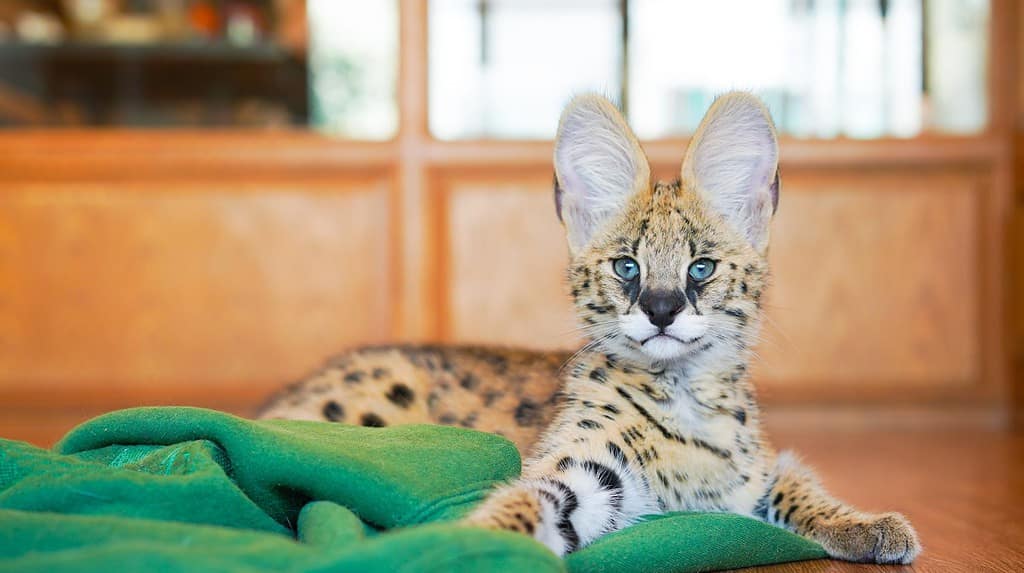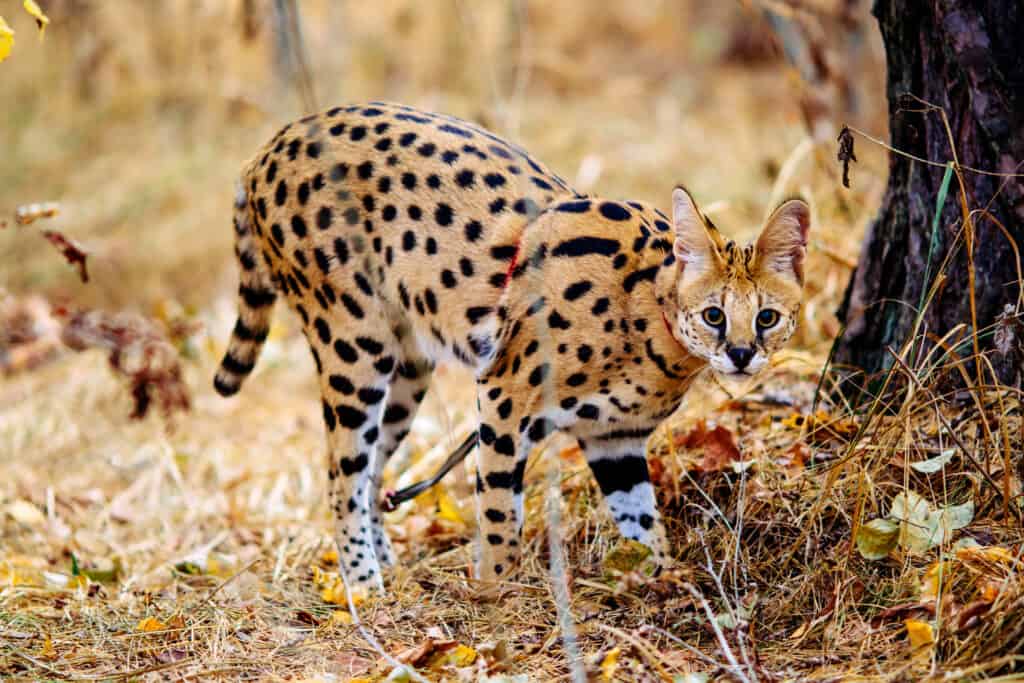Serval cats (Leptailurus serval) are African wild felines that are now mainly found in the reedbeds and grasslands of southern Africa. These are slender, agile, and stunningly beautiful cats with black spots and stripes who weigh up to 40 pounds and stand around 23 inches tall. You may have spotted them in social media posts adorning homes and gardens as exotic pets. But how dangerous are serval cats and what are the risks to humans, dogs, and other pets? Here we take a detailed look at the potential dangers they may present.
Are Serval Cats Dangerous to Humans?
While most serval cats will not go out of their way to attack humans, you must bear in mind that they are wild animals and are, therefore, unpredictable. Even if they are born in captivity, they have very strong hunting and territorial/defensive instincts that could cause a danger to humans.
There is a published report of a serval called Copper attacking a toddler at a birthday party in a zoo. The child received a bite wound to the head and his mother was left ‘traumatized’. This serval was hand-reared and had encountered thousands of people before without an issue. Another social media report describes an attack on a child by a serval in an exotic pet store that, again, left the child with a head injury. Rapper-producer Mally Mall released a video of him being scratched by his pet serval. Finally, a four-year-old boy was attacked by a 40-pound serval on Mamm Ave, New York, as the pet was being taken for a walk. The animal bit the child on the neck and face. The little boy required surgery for the bites, and the animal was destroyed later that day.
Can a Serval Cat Kill a Human?
Serval cats have sharp claws and teeth that can cause nasty injuries, but their relatively small size means that it is very unlikely that they would kill a human. The danger they present is not comparable to that of a lion, for example. Children are probably most at risk as it would be very hard for a serval to overcome a fully grown adult.
Are Serval Cats Good Family Pets?

Serval cats require special conditions and expertise when kept as pets.
©Roselynne/Shutterstock.com
There is no doubt that serval cats are stunning animals, and it is understandable that people would want to own them as pets. They have been the ‘designer cats’ of the exotic pet trade for some time and are viewed by some as a status symbol. However, they are nothing like domesticated cats and do not make great pets. These animals need very large and enclosed indoor spaces and a raw diet. It is unlikely that you will ever litter train them; they are more likely to urine mark your home. If you do not provide them with appropriate enrichment activities, they can develop behavioral issues.
Is It Legal to Own a Serval Cat in the US?
Laws on exotic pet ownership vary by US state. You cannot own them legally in some states, while in others, you need a special permit. The same is true in several Canadian provinces, and in the UK, you need a license to keep them under the Dangerous Wild Animals Act.
Do Serval Cats Get Along With Domestic Cats?
Servals are not a social feline species (unlike lions) and live a solitary life in the wild. Therefore, they are likely to view a domestic cat as competition and will have no time for them at all. This could spill over into aggression. As wild animals, they are much more aggressive and larger than domestic cats. Therefore, any confrontation between the two is likely to result in the domestic cat getting hurt.
That said, there have been occasions where they have got on very well indeed! The proof of this is the savannah cat – a hybrid of a serval and a domestic cat. The first was done during the 1980s.
Can Serval Cats Kill a Dog?

Serval cats have attacked dogs in their native habitat and when kept as pets.
©PRESSLAB/Shutterstock.com
There are reports of serval cats attacking a dog. The serval involved was a pet but had escaped and was later destroyed. It is likely that a serval cat would consider a dog to be a potential threat and would, therefore, behave defensively. They weigh up to around 40 pounds and could probably overpower a smaller dog. Servals are solitary animals in the wild, and it is unlikely that they would get along with a domestic dog. What’s more, they have been known to prey on dogs and poultry in their native African habitats.
Also, servals can carry some diseases, including canine parvovirus, that can be transmitted to dogs.
Do Serval Cats Get On With Smaller Pets?
If you have pet rabbits, hamsters, mice, or birds, getting a serval cat as a pet is a bad idea. In the wild, their diet is made up of 94 percent rats, mice, and shrews. The remainder comprises birds, frogs, lizards, and insects. Their hunting success rate (almost 50 percent) is high. Most importantly, this level of success is also recorded in servals that have been reintroduced to the wild. This strongly suggests that pet servals will have retained their hunting skills and will have no hesitation in trying them out on your pet bunny or bird.
Summing up How Dangerous Are Serval Cats?
Serval cats are wild African cats with impressive hunting and defensive skills. Even though they have been part of the exotic pet trade for some time, they have very specific care requirements that few households can meet. As wild animals, they are unpredictable. There are, albeit rare, reports of them attacking dogs, small mammals, and birds, and they probably also present a risk to pet cats. The infrequent attacks on humans, especially children, have resulted in nasty injuries.
The photo featured at the top of this post is © Benny Marty/Shutterstock.com
Thank you for reading! Have some feedback for us? Contact the AZ Animals editorial team.






